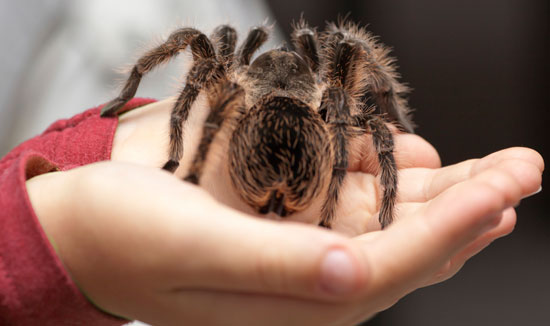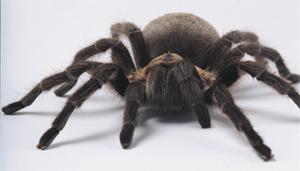How to Keep Spiders as Pets
Spiders can make fascinating pets. Here are a few steps to get you started keeping spiders.

Step 1: Catch a spider
Spiders are all around us, indoors and out, so they’re not hard to find. Some species can bite and a few are venomous. Learn about dangerous spiders in your area before heading out. It’s easy to safely catch a spider by using a small jar. Gently coax it into the jar using the lid. Spiders will eat each other, so keep only one per jar.
Step 2: Prepare a cage
Large spiders do well in the inexpensive plastic terrariums available from pet stores. Smaller ones can be kept in jars or plastic containers if air holes are drilled into the lid or sides. Be sure the holes are small enough to prevent escape.
Potting soil makes good cover for the cage bottom. Sticks, dead leaves or artificial plants provide structure for hiding, climbing and webbing.
Step 3: Water
Depending on the size of the spider, anything from a plastic bottle cap to a small bowl can serve as a water dish. Spiders also drink water sprayed on webbing, but you should never allow the cage to become damp.
Step 4: Feeding
Offer insect prey once or twice a week. Crickets are available from pet shops, or you can collect insects outdoors if no insecticides have been sprayed in the area.
Step 5: Observing
Watch your spider and take notes on its behavior. You won’t believe what happens in the spider’s web until you’ve visited it yourself!
PREFERRED PETS
 Not all spiders do well in captivity. Active hunters are usually easier to keep than web builders. Here are a few that make good pets.
Not all spiders do well in captivity. Active hunters are usually easier to keep than web builders. Here are a few that make good pets.
Tarantulas: Some species exceed 10 inches in legspan. They’re by far the most popular pet spiders and can be bought in pet stores.
Wolf Spiders: Some can be more than three inches in legspan. Large specimens do best in terrariums with lots of floor space.
Jumping Spiders: Although small and rarely exceeding half an inch, their jumping ability is amazing. Many species are brightly colored and can easily be kept in jars.
Fishing Spiders: In captivity, these large spiders appreciate vertically arranged pieces of bark for climbing. They’re very fast, so use caution when capturing them.
Grass Spiders: These spiders build funnel-shaped webs in grass, bushes and on buildings. In captivity, they will build extensive webs inside their cage.
LEARN MORE: Click here to see photos of a spider expert’s seven favorite spiders
This was helpful
How and what do I feed my spider? I found it in my tub and it’s the size of a fruit fly.
should I buy one or find one in the wild
Pls can someone tell me the name of my spider.small in size and it have thorns in the abdomen
This is day one for me and I just caught 8 spiders today!! I am terrified of spiders and would hate to be bit or have one crawling on me but they are so fun to catch it’s a great challenge especially being scared of them it’s an adrenaline rush. I can’t wait to name them all tmrw!
I actually have a small female spider but turns out there was a second one of the same species on a piece of bark I put in its enclosure. Now I have a male spider.😂
Do spiders eat caterpillars?
I like spiders but they are really scary and I can not lie.